If you’re working with content and want to increase your website’s traffic, then Quora is an excellent forum to use.
Quora is a large forum filled with questions where you have the option to answer the questions and add links to your website.
The main issue is that you want to be efficient and answer the questions with the most traffic.
This QApop can help with this, and I’ve been using it since 2021 and have seen it evolve into the incredible keyword research tool for Quora it is today.
So let’s get into it.
Key Takeaways
- Find high-traffic questions on Quora, where you can add links to your website.
- Track keywords on Quora and be the first to answer.
- Answer questions with the AI draft function for efficiency.
Pros And Cons Using QApop
QApop started as a Quora tool where you could only run reports for keywords, and it was a great start, but today you can do so much more.
Here are my pros and cons of using QApop.
Pros of QApop
- You get an overview of all high-traffic questions based on your keywords.
- The tracking features let you automate your keyword research on Quora.
- The in-depth analysis is awesome and gives you Google search volume as well.
Cons of QApop
- The AI-generated answers are not the best quality.
- There are no integrations to automate it further.

QApop
My Quick Take
QApop has made my efforts on Quora much more efficient, targeting the questions with the most traffic and potential.
On top of this, I’ve automated my efforts with the tracking module, and it works so well.
Use code phillipstemann for 10% off.
What Is QApop?

QApop is a marketing tool that helps you make Quora a new marketing channel for your website.
It helps you find relevant questions to either write a blog post or to write a perfect answer to generate traffic to your website.
On top of this then, you can track keywords to find unlimited questions. And when you find questions, then you can generate AI-Powered content drafts to become even more efficient.
In summary, you can use QApop to get high-quality traffic to your website if you answer the right questions greatly.
Get actionable SEO tips in your inbox
Join 900+ other website owners to receive a weekly SEO video from my YouTube channel, which I’ll share.
And on top of that, an actionable SEO tip every week.
QApop Review Features
Now let’s dive into the exciting part of this QApop review, the actual features.
QApop is divided into 5 modules, and I’ll share my experience with all 5 modules to hopefully help you understand how to use QApop to find relevant questions.
Discovery Module: Find High-Traffic Questions
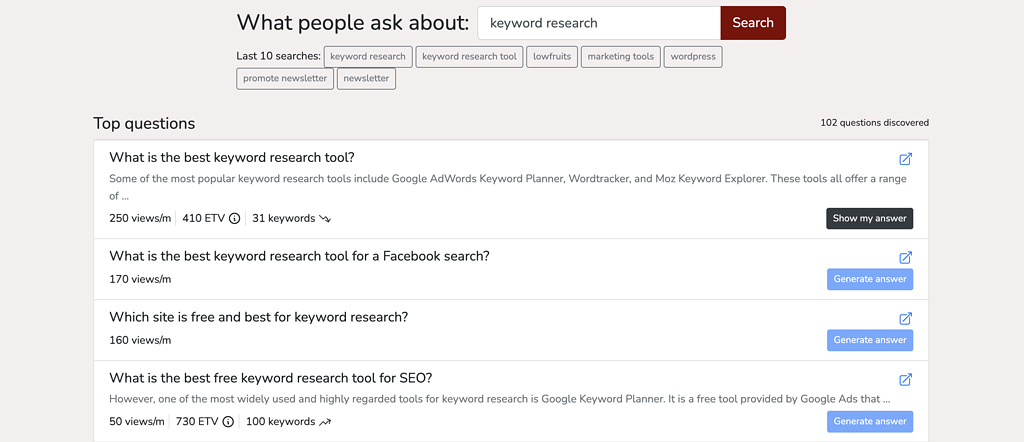
This module has been added recently, and it’s super efficient. Simply add your keyword on top, and then QApop finds questions on your keyword and sorts them by estimated views per month.
For each question in the list, you get the following:
- Question Title
- Small description
- Views per month
- Estimated traffic volume on Google
- Keywords the question ranks for
So the thing is, even though a question doesn’t have a lot of traffic now, it might be ranking for more keywords or even be a new question, so it would be an investment for you to answer the question now and then hope it’ll take off.
I really like you get 2 data points on traffic. Both a number on the Quora traffic, but as all questions from Quora rank on Google, you also get estimated traffic from Google and amount of keywords the question ranks on.
This is such an awesome module, and you can easily generate an answer using AI or open the question and answer it manually.
I’m a big fan of this module, and you can see for just the keyword “keyword research” it found 102 questions.
Top Keywords: Analyse Your Website For Keywords
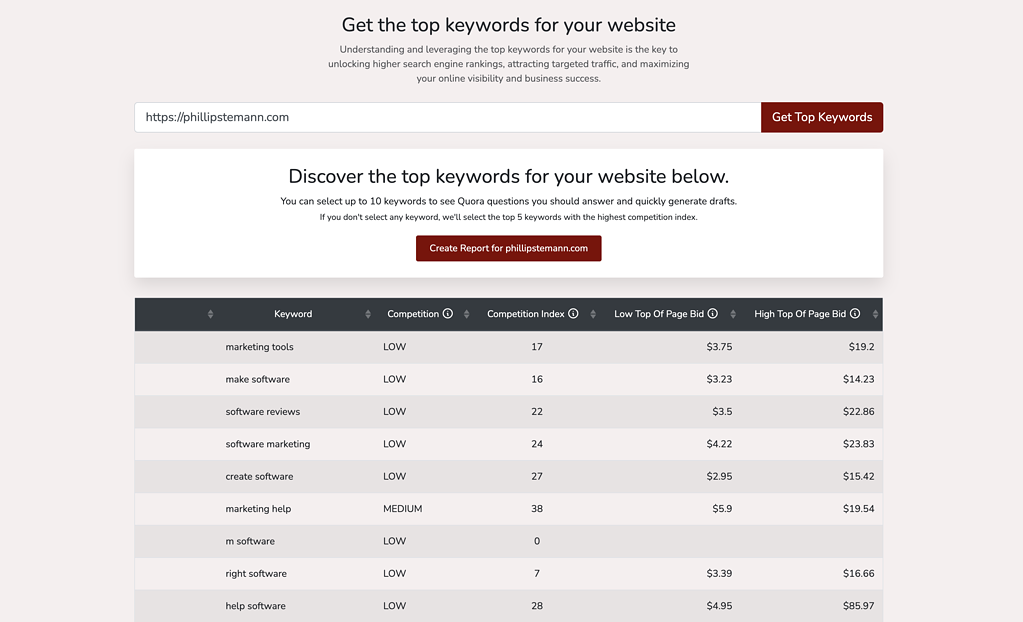
If you’re in doubt about what keywords you should search for in the report or discovery module, then you can use the newest module from QApop, which is Top Keywords.
Simply enter your domain name, and then QApop analyses your website and looks for keywords on your website with traffic on Quora, so you can easily use these keywords in the report module or discovery module.
Another thing which is super interesting is that QApop also works great for finding questions to run ads for on Quora.
If your marketing activities include advertising, you can easily use QApop to run a report and find relevant keywords and questions to run ads on.
This gives you exclusive insights into Quora on how to use it in multiple ways to drive traffic to your website.
Reports: Get A More In-Depth Quora Report Of Questions
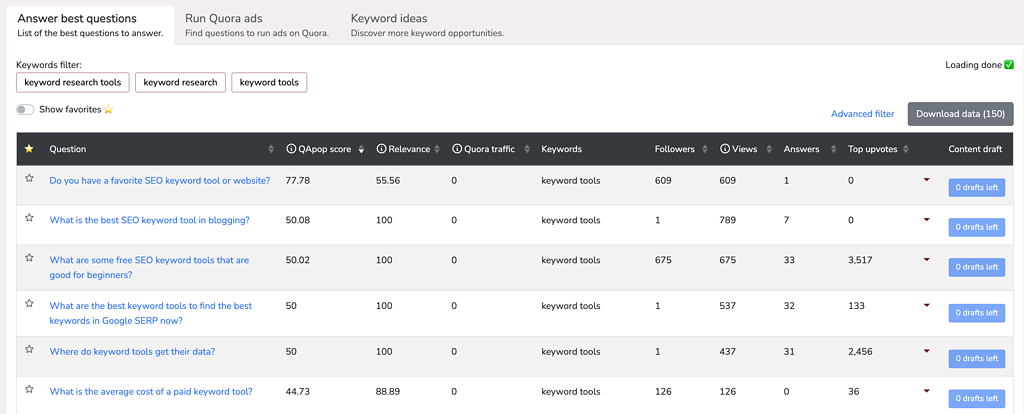
If you’re looking to make an informed decision, then the reporting module is where you need to go to.
To find relevant questions for your target audience, simply use the same approach as with the discovery module, where you enter your keyword.
The difference is that you get much more in-depth analysis and data if you want to run Quora ads to find potential customers.
When you run a report, you get the following data points for each question:
- Question
- QApop score
- Relevance
- Quora traffic
- Keywords
- Followers
- Views
- Answers
- Top upvotes
So as you can see, there are many more data points to make the right decision on what question to pursue first.
I found that sorting by the QApop score gives the best results as it sometimes predicts questions that will take off. It’s an awesome feature.
The QApop score is based on an algorithm developed by QApop that combines multiple data points to give the question a score.
If you’re looking to run ads for potential customers, switch the tab to the Quora ads tab.
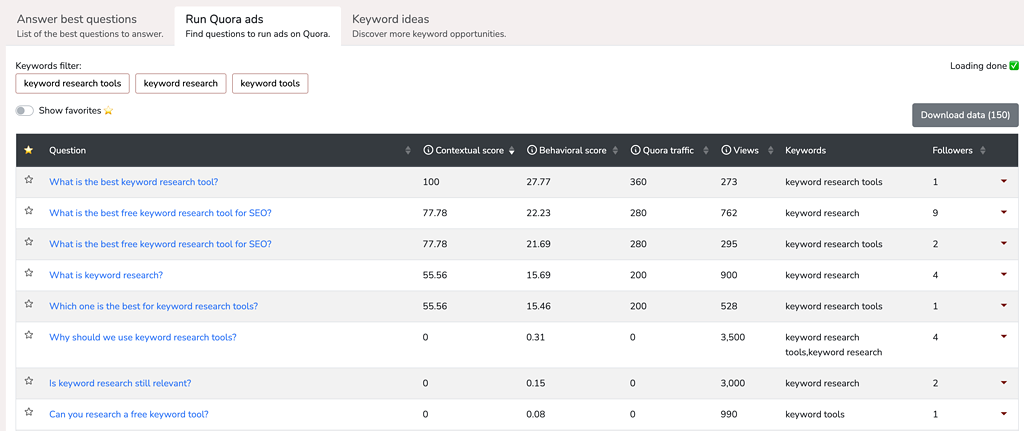
Here you get much more data again than in the discovery module. And all this data helps you find marketing opportunities to run ads on.
For each question in this list, you get the following:
- Question
- Contextual score (Uses contextual languages to find the best question for ads)
- Behavioural score (Uses behavioural targeting)
- Quora traffic
- Views
- Keywords
- Followers
This is a great overview to find the best questions and keywords to run ads for, but if you want keyword ideas to either narrow your search or search differently, then the last tab contains keyword ideas.
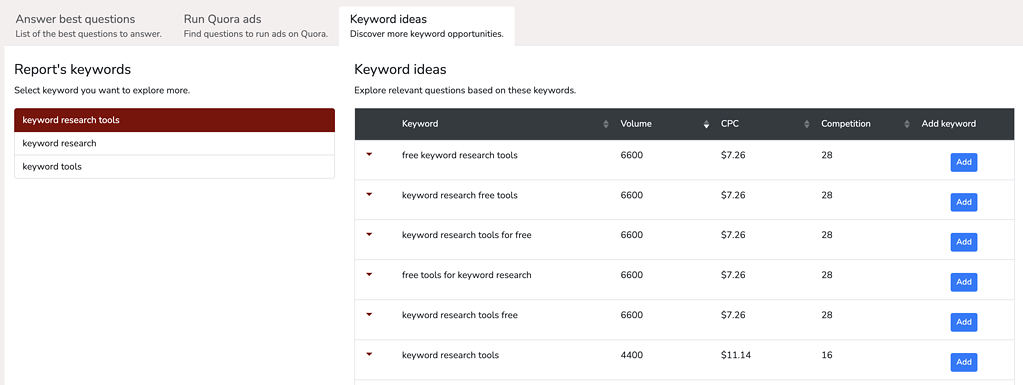
You can see this module as a module showing related keywords.
These keywords you can run reports on or add to a report. You can also run them through the discovery module.
I really like this module, as it helps me focus my search on important keywords I might’ve missed.
I often find top-performing questions by running a report on these keyword ideas.
So as you can see now, the reporting module is like the discovery module but with much more data.
Tracking: Track Important Keywords For Your Website
This is the tracking module, and it helps you track questions and keywords.
I’ve set it up to track 2 keywords at the moment, and I get an email every time new questions match my keyword.
You can choose how often you want to receive the email: Hourly, daily or weekly. And no complaints here. It works flawlessly.
I wish they would only add a way to make multiple tracking reports. Because if I’m running a marketing service or have multiple websites, I want to split up the reports. Otherwise, it’ll end up becoming super messy.
But this module really helps you automate your Quora efforts and is basically like using the keyword ideas explorer on autopilot as you get an email with new keywords.
Content Drafts: Get An Overview Of Your AI Content
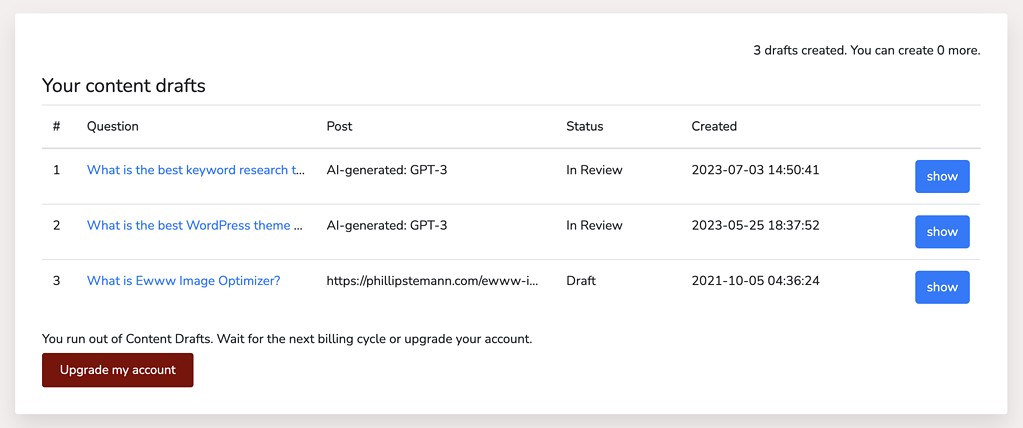
This is just a brief overview of your AI content drafts. I didn’t find myself using this a lot, but it does what it’s supposed to: Give you an overview.
You can generate answers purely on GPT-3, but you can also add your blog post URL and let QApop analyse your blog post and create an answer based on your URL.
These types of answers definitely work better than the GPT-3 answers as they’re often too generic, whereas the website is content created by you.
Who Is QApop Made For?
QApop is made for content creators who want to create more traffic for a specific blog post or your website in general.
It’s also made for businesses who want to share their experience and use Quora for upselling their services.
So if you’re in one of these 2 categories, you must try QApop. It only takes a couple of minutes from signing up until you’ve run your first report.
The last category is marketing agencies. You can easily use it to find lucrative questions for your clients to create more traffic to your client’s websites.
I’m super satisfied with QApop, and it’s an awesome tool in my arsenal of SEO tools.
Wrap-Up: Is QApop Worth It?
Yes, QApop is more than worth it. It makes you so efficient working with Quora.
If you’re already working with Quora, then QApop will eliminate all the time you spend finding questions with low organic traffic.
With QApop, you get all related questions to your keywords with traffic estimation, organic traffic and much more.
I see it as a minor marketing report on Quora based on my keywords, and it works brilliantly. It’s such an exciting tool.

QApop
My Last Thoughts
If you’re looking for a new traffic channel, look towards forums such as Quora and Reddit.
With QApop, you get so much valuable insights into the questions asked on Quora so you can answer and get traffic to your website.
Use code phillipstemann for 10% off.
QApop

In this Quora Review, I go through all 5 modules to find high-traffic questions on Quora where you can drive traffic to your website.
4
Pros
- You get an overview of all high-traffic questions based on your keywords.
- The tracking features let you automate your keyword research on Quora.
- The in-depth analysis is awesome and gives you Google search volume as well.
Cons
- The AI-generated answers are not the best quality.
- There are no integrations to automate it further.


